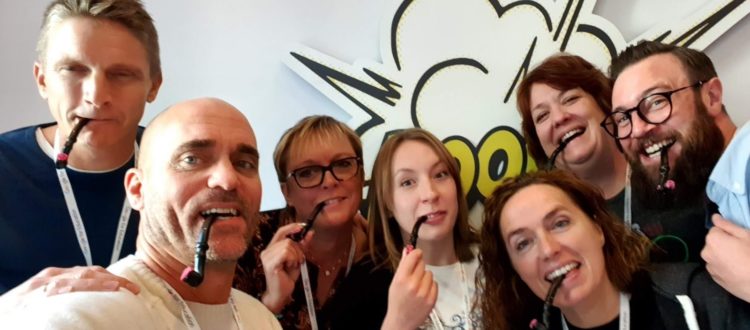Lessons from #GoogleEI #SWE19: Risk Taking and Imposter Syndrome
By Lynne Herr
Recently I returned from a 3-day Certified Innovator Academy at the Google offices in Stockholm, Sweden. Out of hundreds of applicants, 36 of us from 12 nations were tapped to join the #SWE19 academy to tackle some of the biggest challenges in education we could each imagine. We arrived as classroom teachers from the US and South Africa and professors from Leeds and Rome. Tech trainers from Edinburgh and techno-preneurs from London. We left as a united team of Innovators who believe not only that we will succeed in solving the problems we identified; we will transform the world with the support of each other.
But we didn’t start out that way. It turns out that most of us arrived full of anxiety and doubt. Were we up to the challenge? Did we have what it takes? Had the judges who tapped us made a mistake? We were in the grips of imposter syndrome – persistent feelings of inadequacy despite a record of success.
Through my work with new teachers every year at ESU 6, I often see imposter syndrome as the first day of school creeps closer for brand new classroom teachers. And much of our work is convincing them that yes, they belong. They are ready for this. And in the best cases, they come to understand that they are expected to fail. They are applauded for recognizing when something didn’t go as planned. They know to consult their mentors, talk through the reasons for failing and pivot to try a new approach that will hopefully lead to a better outcome. They are safe and supported.
As a life-long educator, I always show up to any experience wearing both my student hat and teacher hat. I pay attention to the structure of an experience – how an activity is designed, how much time is devoted to independent vs whole group vs small group tasks, how we are pushed, how we are supported – so I can take the best elements back to my work with educators.
So I was especially intrigued that with only 3 days to accomplish a LOT of needed work on really complex problems we had all submitted with our applications, much of our time on the first day, and the weeks leading up to it, was focused on building relationships and a supportive culture in part to combat imposter syndrome, but also to make us all feel accepted and supported. The first activity on Day 1 was watching a video prepared by the #NYC19 Innovator cohort convincing us we all belonged in this select group of Innovators, and that we were indeed up to the challenge. That we were supported by those in the room and those who had gone before us. That we were in a place where failure is celebrated more than success because if we aren’t failing, we are too invested in our original thinking to be open to new ideas. We practiced “yes, and” thinking instead of “yes, but” thinking. We floated ideas that felt big and scary, only to be encouraged to think “10X” – bigger and scarier.
And we did it. We built prototypes and gave feedback. We sprinted and sparked. We trusted our partners to guide us through a game of modified dodge ball while blindfolded. We wore our propellor-topped baseball caps as we pitched our ideas to a live-streamed audience on graduation day. We left Stockholm knowing the work had just begun, but we were all in this together and we were up to the task.
As teachers and administrators, you shape the physical safety of your classrooms and schools. You install security systems for entry to your buildings and hire resource officers. You practice drills to protect students from shooters, fires and tornados because every student should feel physically safe at school. But sometimes we get so focused on data and assessments that we forget to invest time in creating a psychologically safe learning environment. We give climate surveys, but what do we do with the results?
And sometimes teachers are forgotten in the process.
Through my work with educators over the past 25 years, I’ve encountered schools with amazing cultures where both students and staff are proud to be part of the #bulldogway or understand what it means to represent #Vikingclass. I see the work that goes into promoting #bekind cultures and circles of friends for students. Unfortunately, I also see educators who live and work in cultures where they themselves are hesitant to share a new idea at a staff meeting, or ask to change how or what they teach. To admit an area of weakness and ask for help. They dread classroom walk-throughs that will return a list of “should haves” while missing the “awesomes.” Conformity is often valued much more than innovation.
As you consider risk-taking inside your own family, house of worship, or workplace, ask: Do I feel valued and heard? Am I so invested in “the way it’s always been done” that I’m missing opportunities to do it better? Do I keep valid concerns to myself out of fear of rejection or dismissal? Do leaders actively solicit honest feedback and I feel safe in giving it?
Yes? No? If things could be better, take the brave first step to change them. You’ve got a whole community of innovators out here cheering you on.
Resources
Dare to Lead by Brene Brown
Innovator’s Mindset by George Couros
Power of Moments by Chip Heath and Dan Heath

